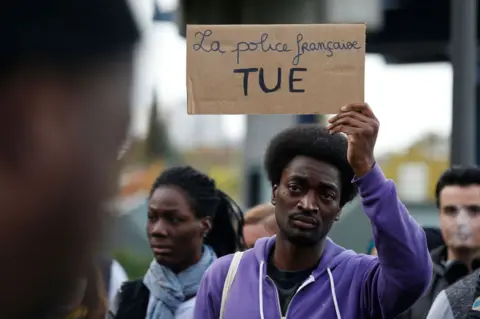Does profiling make sense - or is it unfair?
 Getty Images
Getty ImagesWhether we know it or not, our lives are influenced by profiling in many ways. You may think it's sensible, or that it's unfair… you may even be tempted to think that it's both at once.
Imagine you're a police superintendent in charge of security at a political rally at which the president is speaking. You have information that someone may attempt to assassinate her. You know nothing about the potential killer and as usual you're stretched for resources. Should the few officers you have at your disposal give equal attention to all members of the crowd? Or would it make sense for them to concentrate more on men than on women? Might it be reasonable to conclude that those who appear to be over 75 years old pose less of a threat?
Profiling is always in the news. Racial profiling in particular has been held partially responsible for riots from the UK to the US to France.
Profiling is the practice of categorising people and predicting their behaviour on the basis of particular characteristics. We're profiled all the time - by businesses and insurance companies, for example. Companies that agree to give us car insurance want to know what we do for a job, where we live, our age and marital status. This information is a proxy, a clue to our lifestyle and behaviour. It helps them assess the likelihood that we will be involved in accidents. A proxy is a stand-in - a trait such as race, or sex, or religion, used as a short cut to judge something else.
Insurers would like to ask about the sex of the driver because women are safer drivers than men. But in the EU at least, that's no longer allowed (not that it seems to have reduced the gap between male and female premiums.) The puzzle is that profiling with certain proxies can seem at one and the same time both rational and unfair.
 AFP
AFPOf course, the belief that individuals within one group are more likely than others to have a certain characteristic or more prone to a particular type of behaviour, may not always be grounded in sound evidence. The view that one group is on average meaner with money, or richer, or more disposed to dishonesty, may be based on ignorance or prejudice.
But where there are statistical differences between groups, it seems logical to act upon them. Is it really worth the police stopping octogenarian women if they're hunting for criminals carrying knives?
The appeal of profiling is that it saves time and resources, says Tarun Khaitan, associate professor in law at Oxford and Melbourne universities.
Take an airline that wants to make sure its pilots have 20-20 vision.
"There is some statistical evidence that the eyesight of elderly people deteriorates," he says. "So instead of the airline having to figure whether their pilots retain good eyesight by testing everyone over 65, it may be cheaper to have a mandatory retirement age." Here age is a proxy for good vision.
 Alamy
AlamySome proxies will be tougher than others to access. A genetic test may be an accurate proxy for predicting whether people will develop a certain disease, but it may be easier and cheaper to gather information on less precise proxies, such as diet or smoking habits.
It's always important to interrogate the numbers, especially when using proxies such as sex and religion.
First, how big is the statistical difference? If 50.1% of women are linked to behaviour X, and 49.9% of men, using sex as a proxy for X is going to be pretty useless.
Second, how many false negatives and false positives will there be? That is to say, how many threats will you miss if you target only one group, and how many innocent people will come under suspicion?
Suppose it is overwhelmingly the case that a particular crime is committed by people from a particular religious background. If nonetheless only 1% of people from that background are implicated in that crime the 99% end up being tarred with the same brush, despite being innocent.

Is profiling ever justified?
Join the debate in the BBC Global Philosophy Club

Which brings us to the impact of profiling on the individuals being profiled.
Tarun Khaitan says that groups in a "socially and politically and economically vulnerable position" will perceive profiling as "not just unfair but humiliating". He offers this example. If a person is profiled based on their star sign, Virgo or a Sagittarius and so on, they may regard that as eccentric and even unjust. They probably won't feel it's demeaning. But we identify ourselves more closely with our ethnicity, religion, and sex, so when disadvantaged people are profiled on the basis of these characteristics it tends to have a far more noxious effect.
Obviously the impact of profiling will depend upon what is at stake. If a person's job prospects are affected by profiling, that really matters. If profiling only alters the likelihood of facing additional scrutiny at airport security on your annual holiday, that matters a bit less. Frequency is a relevant consideration too. Innocent African-American males who are constantly stopped and questioned by police naturally feel a powerful sense of injustice.
 AFP
AFPProfilers should bear in mind that the policy may have one of two unintended consequences.
It could generate a vicious circle, entrenching the very pattern upon which it is based. For example, members of one race may become alienated at constantly being stopped and searched, and some innocent people within this racial group may be tempted into crime. If one group comes to believe it is being targeted by the state, that's almost bound to undermine its commitment to abiding by the state's rules.
A different effect is also possible. If would-be terrorists become aware that young men of Middle-Eastern appearance are more closely inspected, then they could try to plant bombs or weapons on those arousing the least suspicion - children or old women. Targeting individuals in particular groups then becomes self-defeating.
Despite the pitfalls, profiling can work.
Criminologists such as Bryanna Fox of the University of South Florida have used statistical techniques to investigate property and violent crimes. An ex-FBI special agent, Fox subdivided burglaries into various categories and analysed the characteristics of those convicted of committing these crimes. For example, where burglaries were clearly sophisticated and premeditated, the criminals tended to be older, male, white and with a long criminal history but few arrests. Police departments that experimented by using her profiles solved over 300% more burglaries compared to the departments that did not.
With that kind of success, profiling is not going to disappear. Indeed, in the digital age, as more and more data becomes available for analysis, profiling in its myriad forms is likely to become ever more prevalent.
But Tarun Khaitan warns us that "we should calculate the costs that racial profiling imposes on already vulnerable groups alongside the efficiency savings that might accrue". He believes that the benefits outweigh the costs only under exceptional circumstances.

